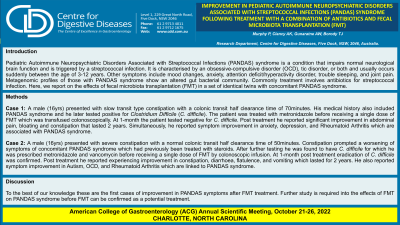Back


Poster Session A - Sunday Afternoon
Category: Pediatrics
A0614 - Improvement in Paediatric Autoimmune Neuropsychiatric Disorders Associated With Streptococcal Infections (PANDAS) Syndrome Following Treatment With a Combination of Antibiotics and Fecal Microbiome Transplantation (FMT)
Sunday, October 23, 2022
5:00 PM – 7:00 PM ET
Location: Crown Ballroom

Has Audio

Thomas J. Borody, MD, PhD, DSc, FACG
Centre for Digestive Diseases
Five Dock, New South Wales, Australia
Presenting Author(s)
Portia Murphy, BSc, Annabel K. Clancy, BSc, APD, PhD, Anoja W. Gunaratne, BAMS, MSc, PhD, Thomas J. Borody, MD, PhD, DSc, FACG
Centre for Digestive Diseases, Five Dock, New South Wales, Australia
Introduction: Paediatric Autoimmune Neuropsychiatric Disorders Associated with Streptococcal Infections (PANDAS) syndrome is a condition that impairs normal neurological brain function and is triggered by a streptococcal infection. It is characterised by an obsessive-compulsive disorder (OCD) tic disorder, or both and usually occurs suddenly between the age of 3-12 years. Other symptoms include mood changes, anxiety, attention deficit/hyperactivity disorder, trouble sleeping, and joint pain. Metagenomic profiles of those with PANDAS syndrome show an altered gut bacterial community. Commonly treatment involves antibiotics for streptococcal infection. Here, we report on the effects of fecal microbiota transplantation (FMT) on a set of identical twins with concomitant PANDAS syndrome.
Case Description/Methods: Case 1: A male (16yrs) presented with slow transit type constipation with a colonic transit half clearance time of 70minutes. His medical history also showed he had PANDAS syndrome and later tested positive for Clostridium Difficile (C. difficile). The patient was treated with metronidazole before receiving a single dose of FMT which was transfused colonoscopically. At 1-month the patient tested negative for C. difficile. Post treatment he reported significant improvement in abdominal pain, bloating and constipation that lasted 2 years. Simultaneously he reported symptom improvement in anxiety, depression, and Rheumatoid Arthritis which are associated with PANDAS syndrome.
Case 2: A male (16yrs) presented with severe constipation with a normal colonic transit half clearance time of 50minutes. Constipation prompted a worsening of symptoms of concomitant PANDAS syndrome which had previously been treated with steroids. After further testing he was found to have C. difficile for which he was prescribed metronidazole and vancomycin before receiving a single dose of FMT by colonoscopic infusion. At 1-month post treatment eradication of C. difficile was confirmed. Post treatment he reported experiencing improvement in constipation, diarrhoea, flatulence, and vomiting which lasted for 2 years. He also reported symptom improvement in Autism, OCD, and Rheumatoid Arthritis which are linked to PANDAS syndrome.
Discussion: To the best of our knowledge these are the first cases of improvement in PANDAS symptoms after FMT treatment. Further study is required into the effects of FMT on PANDAS syndrome before FMT can be confirmed as a potential treatment.
Disclosures:
Portia Murphy, BSc, Annabel K. Clancy, BSc, APD, PhD, Anoja W. Gunaratne, BAMS, MSc, PhD, Thomas J. Borody, MD, PhD, DSc, FACG. A0614 - Improvement in Paediatric Autoimmune Neuropsychiatric Disorders Associated With Streptococcal Infections (PANDAS) Syndrome Following Treatment With a Combination of Antibiotics and Fecal Microbiome Transplantation (FMT), ACG 2022 Annual Scientific Meeting Abstracts. Charlotte, NC: American College of Gastroenterology.
Centre for Digestive Diseases, Five Dock, New South Wales, Australia
Introduction: Paediatric Autoimmune Neuropsychiatric Disorders Associated with Streptococcal Infections (PANDAS) syndrome is a condition that impairs normal neurological brain function and is triggered by a streptococcal infection. It is characterised by an obsessive-compulsive disorder (OCD) tic disorder, or both and usually occurs suddenly between the age of 3-12 years. Other symptoms include mood changes, anxiety, attention deficit/hyperactivity disorder, trouble sleeping, and joint pain. Metagenomic profiles of those with PANDAS syndrome show an altered gut bacterial community. Commonly treatment involves antibiotics for streptococcal infection. Here, we report on the effects of fecal microbiota transplantation (FMT) on a set of identical twins with concomitant PANDAS syndrome.
Case Description/Methods: Case 1: A male (16yrs) presented with slow transit type constipation with a colonic transit half clearance time of 70minutes. His medical history also showed he had PANDAS syndrome and later tested positive for Clostridium Difficile (C. difficile). The patient was treated with metronidazole before receiving a single dose of FMT which was transfused colonoscopically. At 1-month the patient tested negative for C. difficile. Post treatment he reported significant improvement in abdominal pain, bloating and constipation that lasted 2 years. Simultaneously he reported symptom improvement in anxiety, depression, and Rheumatoid Arthritis which are associated with PANDAS syndrome.
Case 2: A male (16yrs) presented with severe constipation with a normal colonic transit half clearance time of 50minutes. Constipation prompted a worsening of symptoms of concomitant PANDAS syndrome which had previously been treated with steroids. After further testing he was found to have C. difficile for which he was prescribed metronidazole and vancomycin before receiving a single dose of FMT by colonoscopic infusion. At 1-month post treatment eradication of C. difficile was confirmed. Post treatment he reported experiencing improvement in constipation, diarrhoea, flatulence, and vomiting which lasted for 2 years. He also reported symptom improvement in Autism, OCD, and Rheumatoid Arthritis which are linked to PANDAS syndrome.
Discussion: To the best of our knowledge these are the first cases of improvement in PANDAS symptoms after FMT treatment. Further study is required into the effects of FMT on PANDAS syndrome before FMT can be confirmed as a potential treatment.
Disclosures:
Portia Murphy: Centre for Digestive Diseases – Employee.
Annabel Clancy: Centre for Digestive Diseases – Employee.
Anoja Gunaratne: Centre for Digestive Diseases – Employee.
Thomas Borody: Axent medical Pty. Ltd – Advisory Committee/Board Member. Centre for Digestive Diseases – Advisory Committee/Board Member, Consultant, Employee, Grant/Research Support, Intellectual Property/Patents, Ownership interest, Owner/Ownership Interest, Stock-privately held company. Finch Therapeutics – Advisory Committee/Board Member, Intellectual Property/Patents, Stock-publicly held company(excluding mutual/index funds). Topelia Therapeutics – Advisor or Review Panel Member, Intellectual Property/Patents.
Portia Murphy, BSc, Annabel K. Clancy, BSc, APD, PhD, Anoja W. Gunaratne, BAMS, MSc, PhD, Thomas J. Borody, MD, PhD, DSc, FACG. A0614 - Improvement in Paediatric Autoimmune Neuropsychiatric Disorders Associated With Streptococcal Infections (PANDAS) Syndrome Following Treatment With a Combination of Antibiotics and Fecal Microbiome Transplantation (FMT), ACG 2022 Annual Scientific Meeting Abstracts. Charlotte, NC: American College of Gastroenterology.
